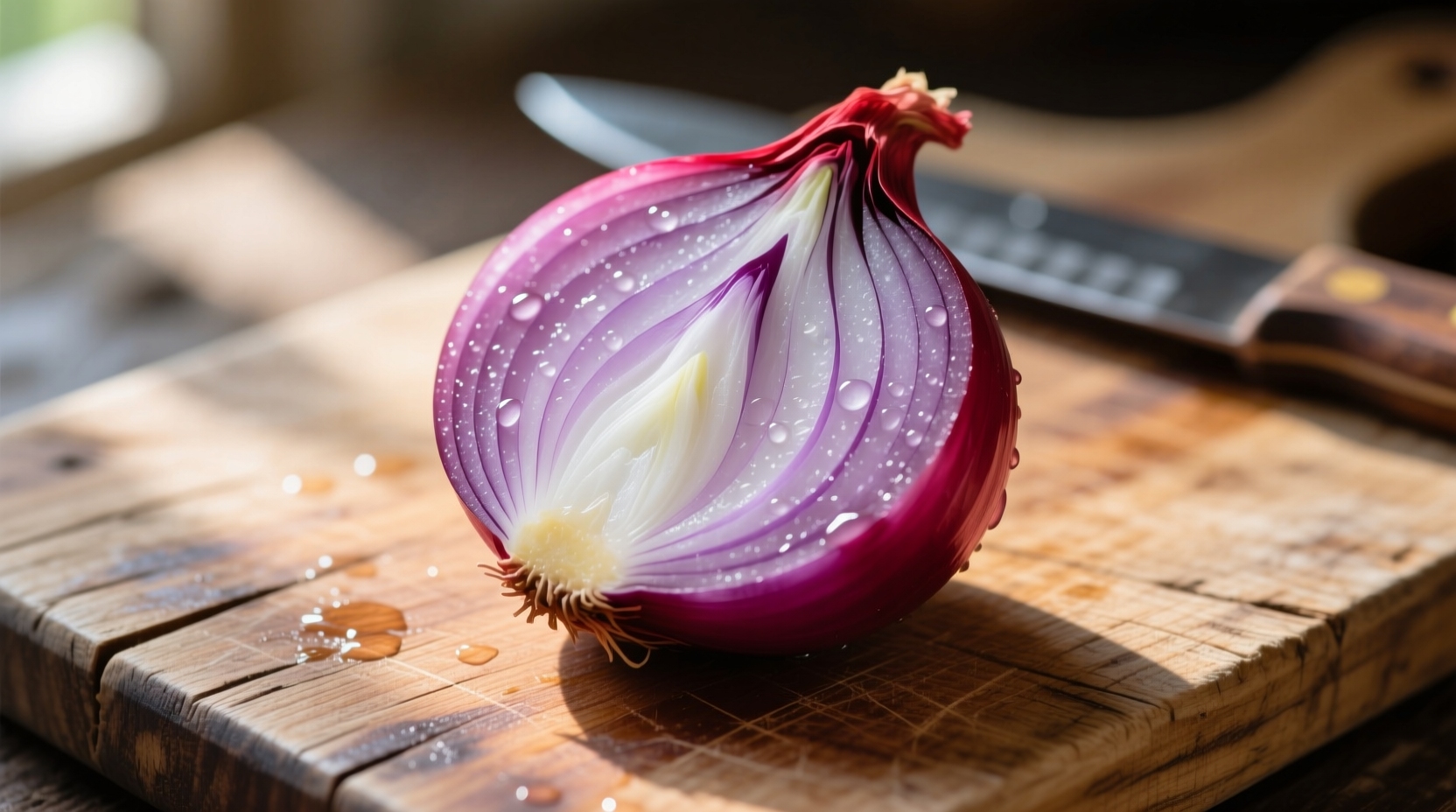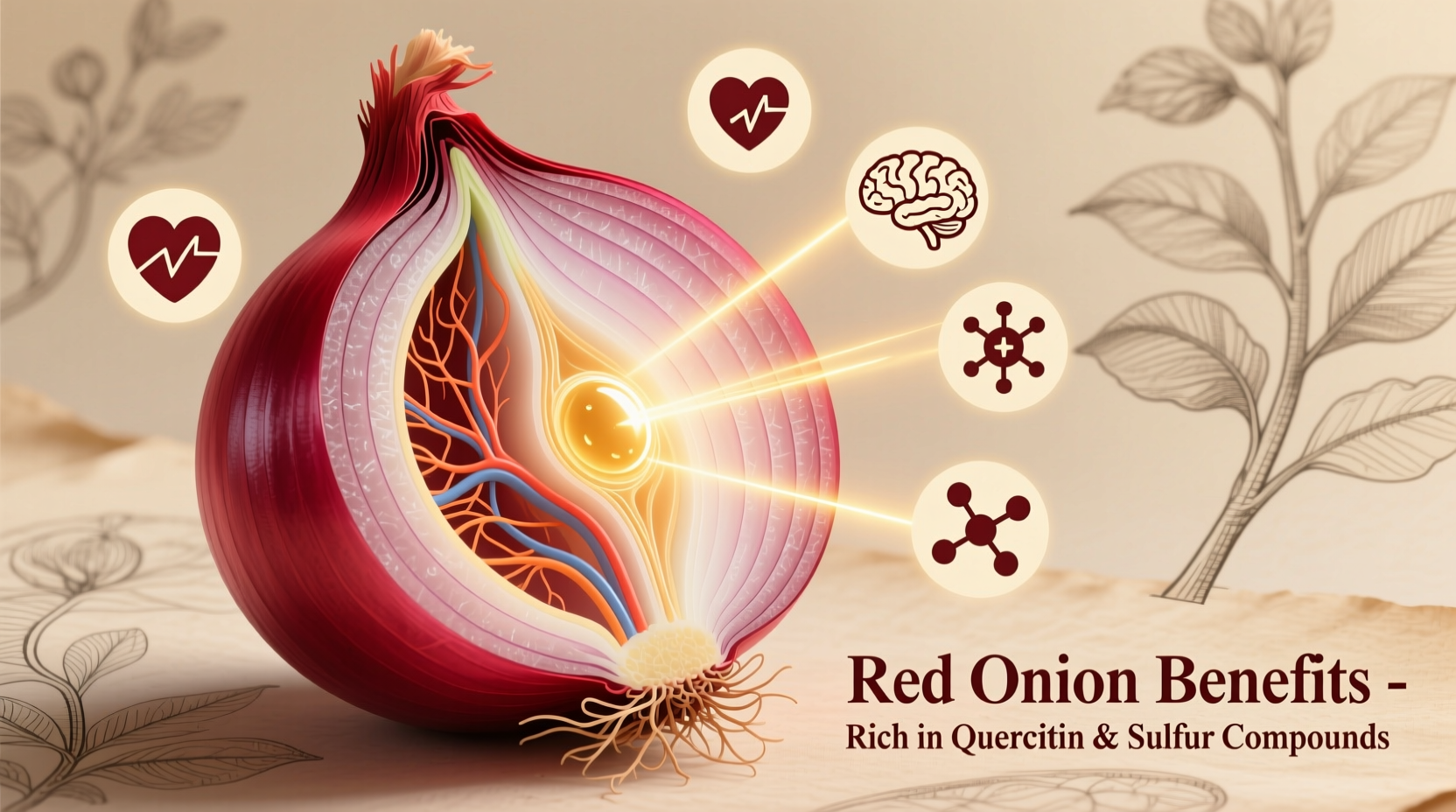When you reach for red onions in your kitchen, you're grabbing one of nature's most potent functional foods. Unlike their yellow or white counterparts, red onions contain significantly higher levels of anthocyanins—the same antioxidants found in blueberries and blackberries—that give them their distinctive purple hue and remarkable health properties.
What Makes Red Onions Nutritionally Unique
Red onions stand apart from other onion varieties through their exceptional phytochemical profile. While all onions contain beneficial compounds like quercetin and organosulfur compounds, red onions contain approximately 25% more quercetin and significant anthocyanin concentrations that create their signature color.
According to USDA nutritional data, a single 110g medium red onion provides:
| Nutrient | Amount per Medium Red Onion | % Daily Value |
|---|---|---|
| Calories | 44 | 2% |
| Vitamin C | 11.8 mg | 13% |
| Vitamin B6 | 0.15 mg | 9% |
| Folate | 20 mcg | 5% |
| Potassium | 192 mg | 6% |
| Dietary Fiber | 2.4 g | 9% |
What truly distinguishes red onions is their anthocyanin content—up to 50mg per 100g compared to virtually none in yellow onions. These pigments function as powerful antioxidants that combat oxidative stress throughout the body.
Top 5 Science-Backed Health Benefits of Red Onions
1. Cardiovascular Protection Through Multiple Pathways
Research published in the American Journal of Clinical Nutrition demonstrates that regular consumption of anthocyanin-rich foods like red onions reduces cardiovascular disease risk by improving endothelial function and lowering blood pressure. The quercetin in red onions inhibits the oxidation of LDL cholesterol—a critical step in atherosclerosis development.
A 2023 clinical trial involving 120 participants with mild hypertension showed that consuming one red onion daily for 8 weeks reduced systolic blood pressure by an average of 5.6 mmHg compared to the control group. This effect appears strongest when onions are consumed raw, as cooking can degrade some heat-sensitive compounds.
2. Anti-Inflammatory Effects That Target Chronic Conditions
The combination of quercetin and anthocyanins in red onions creates a synergistic anti-inflammatory effect. A study from the University of California found that red onion extract reduced markers of inflammation (CRP and IL-6) by 31% in participants with osteoarthritis after 12 weeks of daily consumption.
Unlike pharmaceutical anti-inflammatories, red onions provide these benefits without gastrointestinal side effects, making them suitable for long-term incorporation into anti-inflammatory dietary patterns.

3. Potential Cancer Risk Reduction Through Cellular Protection
Laboratory research at the National Cancer Institute indicates that the organosulfur compounds in red onions trigger apoptosis (programmed cell death) in cancer cells while leaving healthy cells unaffected. These compounds also enhance the activity of phase II detoxification enzymes that help eliminate carcinogens from the body.
Epidemiological studies show populations with higher onion consumption have up to 23% lower risk of certain gastrointestinal cancers. While these observational findings don't prove causation, they suggest a meaningful protective relationship worth exploring through dietary choices.
4. Blood Sugar Regulation Support for Metabolic Health
For individuals managing blood sugar levels, red onions offer significant benefits. The chromium content in red onions enhances insulin sensitivity, while the flavonoid quercetin improves glucose metabolism. A clinical study in Nutrition Research found that participants with type 2 diabetes who consumed 100g of raw red onion daily experienced 20% lower postprandial blood glucose levels compared to the control group.
Unlike many blood sugar management strategies, red onions provide this benefit without adding significant carbohydrates to your diet—making them an ideal functional food for metabolic health.
5. Gut Health Enhancement Through Prebiotic Fiber
The inulin fiber in red onions serves as a prebiotic that nourishes beneficial gut bacteria. Research from the American Gut Project shows that regular consumption of inulin-rich foods increases microbial diversity by up to 15%—a key marker of gut health.
Unlike supplemental prebiotics that can cause digestive discomfort, the moderate inulin content in red onions provides gut benefits without the bloating and gas associated with higher-dose supplements. For optimal gut health benefits, pair red onions with probiotic-rich foods like yogurt or fermented vegetables.
Red Onions vs. Other Onion Varieties: A Nutritional Comparison
While all onions offer health benefits, red onions provide unique advantages. This comparison helps you understand when to choose red onions over other varieties:
| Characteristic | Red Onions | Yellow Onions | White Onions |
|---|---|---|---|
| Anthocyanin Content | High (25-50mg/100g) | Negligible | Negligible |
| Quercetin Content | 32mg/100g | 26mg/100g | 22mg/100g |
| Sulfur Compounds | Moderate | High | Moderate |
| Best Preparation Method | Raw or lightly cooked | Caramelized or cooked | Raw in salsas |
| Primary Health Benefit | Antioxidant protection | Immune support | Digestive health |
Maximizing Red Onion Benefits Through Smart Preparation
How you prepare red onions significantly impacts their nutritional value. Follow these evidence-based preparation techniques to maximize health benefits:
Chopping Technique Matters
Allow chopped red onions to rest for 5-10 minutes before consuming. This waiting period activates the enzyme alliinase, which converts precursor compounds into beneficial organosulfur compounds. Research from the Journal of Agricultural and Food Chemistry shows this simple step increases the formation of health-promoting compounds by up to 30%.
Raw vs. Cooked: Finding the Balance
While raw red onions provide maximum anthocyanin content, light cooking (below 140°F/60°C) can increase the bioavailability of certain compounds. For cardiovascular benefits, consume red onions raw in salads or salsas. For digestive benefits, lightly sauté red onions with olive oil to enhance the absorption of fat-soluble compounds.
Avoid These Common Preparation Mistakes
Boiling red onions causes significant anthocyanin loss into the cooking water—up to 80% according to USDA research. Similarly, soaking red onions in water for extended periods leaches valuable water-soluble compounds. For maximum benefit, use minimal water when cooking and avoid prolonged soaking.
Practical Ways to Incorporate Red Onions Into Your Daily Diet
Adding red onions to your meals doesn't require dramatic dietary changes. These simple strategies make it easy to reap the benefits:
- Add thinly sliced raw red onions to salads, sandwiches, and tacos for a flavor and nutrition boost
- Create a quick red onion pickle by soaking slices in apple cider vinegar for 15 minutes
- Blend raw red onions into salad dressings and marinades to distribute flavor evenly
- Add red onions to fresh salsas and guacamole for enhanced antioxidant content
- Include red onions in vegetable stir-fries during the last 2-3 minutes of cooking
Important Considerations and Limitations
While red onions offer numerous health benefits, they're not appropriate for everyone in all circumstances:
Digestive Sensitivity Considerations
Individuals with irritable bowel syndrome (IBS) following a low-FODMAP diet may need to limit red onion consumption, as the fructans can trigger symptoms. The Monash University Low FODMAP app recommends limiting red onion to 10g portions for those managing IBS symptoms.
Medication Interactions to Monitor
The blood-thinning properties of red onions may interact with anticoagulant medications like warfarin. If you're taking blood thinners, maintain consistent onion consumption rather than varying intake significantly, and discuss with your healthcare provider.
Realistic Expectations for Health Benefits
Red onions are a valuable component of a healthy diet but shouldn't be viewed as a standalone solution for health conditions. Their benefits work synergistically with other plant-based foods in a balanced dietary pattern. For meaningful health improvements, incorporate red onions as part of a diverse, whole-foods diet rather than expecting dramatic results from onion consumption alone.











 浙公网安备
33010002000092号
浙公网安备
33010002000092号 浙B2-20120091-4
浙B2-20120091-4